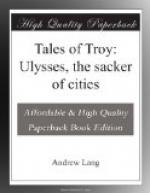The dead fell in heaps, and the living ran over them to mount the heaps of slain and climb the ships. Hector rushed forward like a sea wave against a great steep rock, but like the rock stood the Greeks; still the Trojans charged past the beaks of the foremost ships, while Aias, thrusting with a spear more than twenty feet long, leaped from deck to deck like a man that drives four horses abreast, and leaps from the back of one to the back of another. Hector seized with his hand the stern of the ship of Protesilaus, the prince whom Paris shot when he leaped ashore on the day when the Greeks first landed; and Hector kept calling: “Bring fire!” and even Aias, in this strange sea fight on land, left the decks and went below, thrusting with his spear through the portholes. Twelve men lay dead who had brought fire against the ship which Aias guarded.
THE SLAYING AND AVENGING OF PATROCLUS
At this moment, when torches were blazing round the ships, and all seemed lost, Patroclus came out of the hut of Eurypylus, whose wound he had been tending, and he saw that the Greeks were in great danger, and ran weeping to Achilles. “Why do you weep,” said Achilles, “like a little girl that runs by her mother’s side, and plucks at her gown and looks at her with tears in her eyes, till her mother takes her up in her arms? Is there bad news from home that your father is dead, or mine; or are you sorry that the Greeks are getting what they deserve for their folly?” Then Patroclus told Achilles how Ulysses and many other princes were wounded and could not fight, and begged to be allowed to put on Achilles’ armour and lead his men, who were all fresh and unwearied, into the battle, for a charge of two thousand fresh warriors might turn the fortune of the day.
Then Achilles was sorry that he had sworn not to fight himself till Hector brought fire to his own ships. He would lend Patroclus his armour, and his horses, and his men; but Patroclus must only drive the Trojans from the ships, and not pursue them. At this moment Aias was weary, so many spears smote his armour, and he could hardly hold up his great shield, and Hector cut off his spear-head with the sword; the bronze head fell ringing on the ground, and Aias brandished only the pointless shaft. So he shrank back and fire blazed all over his ship; and Achilles saw it, and smote his thigh, and bade Patroclus make haste. Patroclus armed himself in the shining armour of Achilles, which all Trojans feared, and leaped into the chariot where Automedon, the squire, had harnessed Xanthus and Balius, two horses that were the children, men said, of the West Wind, and a led horse was harnessed beside them in the side traces. Meanwhile the two thousand men of Achilles, who were called Myrmidons, had met in armour, five companies of four hundred apiece, under five chiefs of noble names. Forth they came, as eager as a pack of wolves that have eaten a great red deer and run to slake their thirst with the dark water of a well in the hills.




